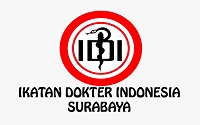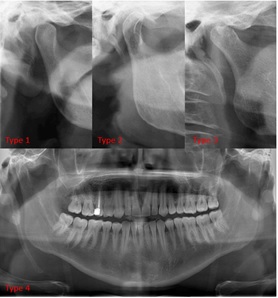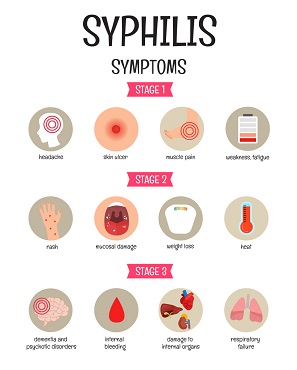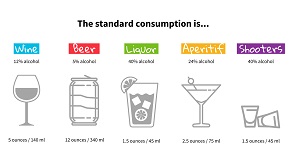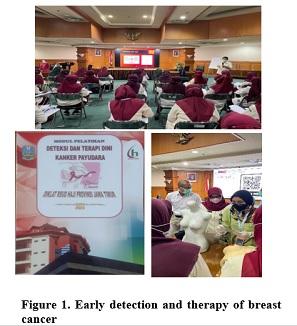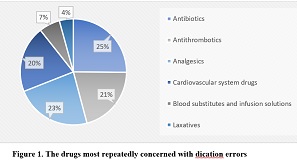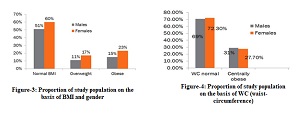CASE REPORT: UNCONTROLLED HYPERTENSION CONTRIBUTES TO WORSENING OF PRESBYCUS SYMPTOMS IN THE ELDERLY
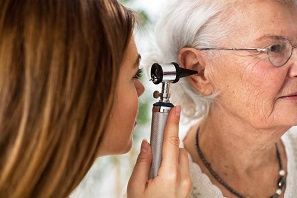
Downloads
Presbycusis is a disease that can befall the elderly, caused by a multifactorial process that should be allowed to disrupt communication and social life and cause mental disorders. According to WHO the proportion of the elderly population rises rapidly which is estimated in 2025, there are about 1,2 billion elderly people with a risk of presbycusis. Mr.S was 84 years old, married and had 2 children, complained of hearing loss since 10 years ago on the patient's left ear. The decline in hearing occurred gradually, giving the last 4 years after his wife's death. Patients was taken to Otorhinolaryngologistand expressed age-related hearing impairment and was advised to use hearing aids. Patients are not routinely using hearing aids. In addition, patients have hypertension and heart disease. Patients consumed Captopril 2x1 tablets, Fundifar 2x1, Furosemide 1x40 mg and Fargoxin 1x0.25 mg. Patients do not routinely consumed cardiac medicine and used hearing aids. From the results of heteroanamnesis, physical examination, and audiogram examination conducted in Mr.S patients, it can be concluded that Mr.S suffers from presbycusis with hypertensive and congestive heart failure. Mr.S was advised to routinely have their hearing check to Otorhinolaryngologist the as an evaluation and routine control to Cardiologist.
Gates GA, Mills JH. Presbycusis. Lancet. 2005 Sep 24-30;366(9491):1111-20.
Nash SD, Cruickshanks KJ, Head Neckein R, et al. The prevalence of hearing impairment and associated risk factors: The Beaver Dam Offspring Study. Arch Otolaryngol Head Neck Surg. 2011 May;137(5):432"9.
Maqbool M, Mahbool S, Textbook of Ear, Nose and Throat Diseases. 11th ed. New Delhi; Jaypee Bro Med; 2007, 120 p.
Lin FR, Metter EJ, O'Brien RJ, Resnick SM, Zonderman AB, Ferrucci L. Hearing loss and incident dementia. Arch Neurol. 2011;68(2):214"220.
Arlinger S. Negative consequences of uncorrected hearing loss--a review. Int J Audiol. 2003;42 Suppl 2:2S17"2S20.
Hussain B, Qasim M, Masoud M, Khan L. Hearing impairments, presbycusis and the possible therapeutic interventions. Biomed Res Ther. 2017 Apr 20;4(4):1228-45.
WHO. Geneva: Basic ear and hearing care resource. 2020. Access: May 19, 2020
Depkes dan Kesos RI. Pedoman kemitraan lintas sektor dalam pembinaan lanjut usia. 2001. Jakarta: Departemen Kesehatan.
Maryam, SR, et al. Mengenal Usia Lanjut dan Perawatannya. 2008. Jakarta:Salemba Medika
Ekowati R, Sulistyowati T. Prevalensi hipertensi dan determinannya di Indonesia. Majalah Kedokteran Indonesia. 2009; 59(12).
Kuswardhani RAT. Penatalaksanaan hipertensi pada lanjut usia. Jurnal Penyakit Dalam. 2006; 7(2):135-40.
Tobian L. Salt and hypertension. Lessons from animal models that relate to human hypertension. Hypertension. 1991 Jan 1;17(1): 52-8
Yusuf, Muhtarum et al. Pedoman praktis Head Neckinis telinga hidung tenggorok bedah kepala dan leher. Dept-Smf Ilmu Kesehatan Tht-Head Neck Rsud Dr. Soetomo FK Universitas Airlangga Surabaya. 2016. Surabaya
Roland, Peter S. presbycusis. Sited from http://emedicine.medscape.com/article/855989-overview#a0104 Januari 2013-01-13
Dhingra, P L and Deeksha, Diseases of Ear, Nose & Throat. 6th ed. New Delhi; Elsevier. 2014. 37p
Copyright (c) 2020 Faradila Budi Saputri, Azizah Amimathul Firdha, Safira Rahma, Rieza Rizqy Alda, Syahwina Inayasari, Nyilo Purnami

This work is licensed under a Creative Commons Attribution-ShareAlike 4.0 International License.
- The journal allows the author to hold the copyright of the article without restrictions.
- The journal allows the author(s) to retain publishing rights without restrictions.
- The legal formal aspect of journal publication accessibility refers to Creative Commons Attribution Share-Alike (CC BY-SA).
- The Creative Commons Attribution Share-Alike (CC BY-SA) license allows re-distribution and re-use of a licensed work on the conditions that the creator is appropriately credited and that any derivative work is made available under "the same, similar or a compatible license”. Other than the conditions mentioned above, the editorial board is not responsible for copyright violation.






